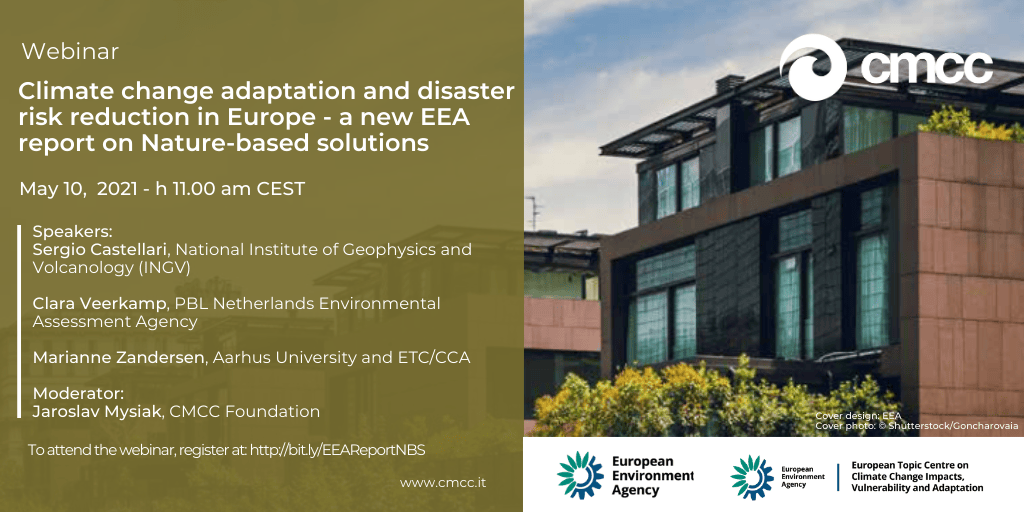
Working with nature and enhancing the role of ecosystems can help reduce the impacts of climate change and increase climate change resilience. Such an approach can deliver multiple benefits, including lowering pressures on biodiversity, improving human health and well-being, reducing greenhouse gas emissions and building a sustainable economy, according to a European Environment Agency (EEA) report published today. The CMCC Foundation contributed to the report in the framework of the European Topic Centre on Climate Change impacts, vulnerability and Adaptation (ETC/CCA) activities.
Source: based on EEA press release
Climate change, biodiversity loss and degradation of ecosystems are linked and all have devastating consequences for our economic and social stability, health and well-being. Working with nature is increasingly recognised as an efficient way to tackle these growing challenges, according the new EEA report ‘Nature-based solutions in Europe: Policy, knowledge and practice for climate change adaptation and disaster risk reduction.’
The report is realized with the extensive contribution of the European Topic Centre on Climate Change impacts, vulnerability and Adaptation (ETC/CCA), an international consortium coordinated by the CMCC Foundation and composed of 15 European institutions, including research, government, non-profit and commercial organizations, active in the area of climate change impacts, vulnerability and adaptation (CCIVA) in Europe. The topic centre is contracted by the EEA to supply thematic expertise and carry out specific activities identified in the EEA programming documents implementing the overarching multi-annual EEA Strategy, recently updated for the 2021-2030 period (see below for further details on the CMCC contribution in the framework of ETC/CCA activities).
The EEA report provides up-to-date information for policymakers on the how to apply nature-based solutions for climate change adaptation and disaster risk reduction and at the same time making use of multiple societal benefits that these solutions can bring. Drawing on selected examples across Europe, the report shows how impacts of extreme weather and climate-related events are already tackled in this way. It also assesses global and European policies and how nature-based solutions are increasingly being integrated in the efforts to shift towards sustainable development.
The EU’s 2030 biodiversity strategy, a key pillar of the European Green Deal, includes a nature restoration plan that can boost the uptake of nature-based solutions. Nature-based solutions are also highlighted in the EU strategy on adaptation to climate change that was recently adopted by the European Commission.
The CMCC contribution in the frame of ETC/CCA activities
As mentioned above, the CMCC Foundation highly contributed to the report in the frame of the European Topic Centre on Climate Change impacts, vulnerability and Adaptation (ETC/CCA) activities, a consortium of 15 European institutions contracted by the EEA and lead by CMCC.
Silvia Medri, CMCC senior scientific manager and ETC/CCA coordinator, and Jaroslav Mysiak, director of the CMCC research division ‘Risk assessment and adaptation strategies’ and ETC/CCA task manager, contributed substantially to the report as Lead Authors. Among CMCC contributors, Silvia Torresan (CMCC and ETC/CCA) contributed the report Chapter 3: “Knowledge base on nature-based solutions for climate change adaptation and disaster risk reduction”, while Elisa Calliari (CMCC and University College London), Andrea Staccione (CMCC and Ca’ Foscari University, Venice) and Francesca Larosa (CMCC and Ca’ Foscari University Venice) contributed to the report Chapter 5 “Financing nature-based solutions”. The authors also thanked, among many contributors, Guido Rianna (CMCC and ETC/CCA), for his key contributions in 2019 to the development of the scoping paper ‘Ecosystem-based approaches for climate change adaptation and disaster risk reduction — Exploring the knowledge base, policies and practices’.
The report was coordinated by Sergio Castellari (EEA and National Institute of Geophysics and Volcanology – INGV- ), and Enrico Ramieri (ETC/CCA and Thetis).
On May 10, 2021, Sergio Castellari will present the report (together with Jaroslav Mysiak, CMCC Foundation and ETC/CCA, Clara Veerkamp, PBL Netherlands Environmental Assessment Agency, and Marianne Zandersen, Aarhus University and ETC/CCA) during the CMCC webinar “Climate change adaptation and disaster risk reduction in Europe: a new EEA report on Nature-based solutions”.
How nature can protect us
Many countries are already restoring nature in river valleys and uplands to reduce downstream flooding risks. In coastal regions, natural vegetation helps to stabilise coastlines, while re-forestation is increasingly used for storing carbon. Nature is also brought back into cities by greening urban spaces or reopening old canals or rivers, which increases resilience to heatwaves and brings additional health and wellbeing benefits. Despite their increasing prominence, nature-based solutions could be mainstreamed further, the report notes.
Other key findings
- An EU-wide mapping of existing and potential nature-based solutions can help to identify priority areas for enhancing ecosystem services and addressing climate change and biodiversity loss concerns.
- Agreed standards, quantitative targets, measurable indicators and evaluation tools for nature-based solutions at EU level can help to assess progress, effectiveness and multiple benefits.
- As nature-based solutions depend on healthy ecosystems, which are themselves vulnerable to climate change, their potential for climate change adaptation and disaster risk reduction may decline in the future.
- Stakeholder involvement, dialogue and co-design of tools and measures are key to increase awareness, to resolve potential stakeholders’ conflicts and to create social acceptance and demand for nature-based solutions.
- Further implementation of nature-based solutions to climate change adaptation and disaster risk reduction in Europe requires development of technical standards, increased knowledge of potential trade-offs, collaborative governance, capacity building and sufficient funding.



